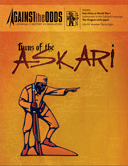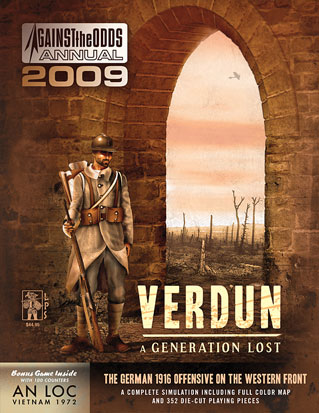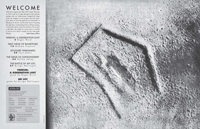| |
2009 Annual - Verdun: A Generation Lost

The complete version of this issue is sold out but you can get the game only from our Black Swans product pages by clicking here.
Inside the 2009 ATO Annual Edition
Hoping to bring a decisive conclusion along the Western Front despite the mud-and misery-filled trench deadlock, German General von Falkenhayn launched an attack from which the French could not retreat, and would prove costly for them to defend. The goal of the German offensive was the historic and symbolic city of Verdun.
The German attack used new weapons such as poison gas, fighter airplanes to clear the skies of enemy observation planes, and a massive collection of artillery to devastate the defenders and obliterate the extensive French fortifications. The offensive was meant to inflict staggering casualties upon the defenders that would compel the Entente to negotiate. In the end, the Germans also suffered losses that ran to the hundreds of thousands, making Verdun a symbol of war's inhumanity as well as tragic sacrifice.
Designed by Roger Nord, Verdun: A Generation Lost is based on the same design as his other WWI game which appeared in Against the Odds #11, The Big Push: The Battle for the Somme. Verdun: A Generation Lost features a 22" by 34" map that, like The Big Push, uses squares to regulate the game's functions, 352 large counters, and approximately 30 pages of rules and charts. Rules cover artillery, defensive fire, and close assault attacks, various types of weaponry, and there are six smaller scenarios covering pivotal aspects of the battle, as follows:
1. Firestorm on the Meuse - In the first year and a-half of the war, Germany held her own on the Western front. In late 1915, General Erich von Falkenhayn devised a scheme to pry open the lines. The German Army would go on the offensive and attack France where he believed she could die fighting - Verdun, an ancient provincial town on the Meuse River. In a remarkable effort Falkenhayn assembles over 1200 guns, many of them heavy pieces, and ten of the Army’s best divisions, in just under two months and in secrecy. They will attack a front of eight miles, pulverizing and crushing resistance....
2. Crown Prince’s Plan - When General Falkenhayn wins the Kaiser’s approval to attack at Verdun, an intense debate has followed at 5th Army Headquarters. Crown Prince Wilhelm, the Kaiser’s son and ostensible commander of the 5th, wanted a broader frontal attack on both banks of the Meuse. His chief of staff, General Schmidt von Knobelsdorf, the real power in the command, readily agreed. But Falkenhayn, ever cautious about potential allied counteroffensives everywhere, held back. He ordered the East Bank offensive only. In this what-if scenario, the Crown Prince gets his way and the whole front opens in fury, west and east. All German forces launch their attacks....
3. Operation May Cup - By early April, the Germans realize that no quick, deadly blow would cave in the Verdun sector. They have chiseled on the East Bank, and then switched to the West Bank, without the dramatic success witnessed in the first week of the offensive. Regrouping, the Crown Prince launches Operation May Cup, designed to capture jumping-off locations for the assault on Verdun itself. Thiaumont with its field-works, Fleury, Fort Vaux and Fort Souville are targets. Let loose for the first time, phosgene gas staggers the defenders. The Alpendivision, one of the best units in the German Army, is sent to breakthrough....
4. Hell’s Doorway - By July, Nivelle has shortened the turnover time for units, resulting in higher casualties and greater fatigue. The Germans increasingly turn their attention to the Somme; infantry and artillery start shipping out to aid defenses there. The drawdown is working; by mid-July German attacks taper off. In the interim, the Germans do their piece meal gains and the French grind back. Verdun takes on a deadly life of its own. The ostensible goal, Verdun town, is blurred in attacks and counterattack s over a moonscape of destroyed ground. Fort Souville looms ahead and must be taken to secure the way. Elite Alpen Korps, backed with phosgene gas, presses ahead through an endless inferno....
5. They Shall Not Pass - By August, fortunes turn against the Headquarters of both armies. Joffre, borrowing from Verdun to pay his favored project, the Somme, runs into disfavor. Parliament conducts a harsh inquiry. Falkenhayn, twittering away his reserves between Brusilov’s offensive, the Somme and Verdun, and gaining little success anywhere, runs into his own political wall. The tandem of Von Hindenburg and Ludendorff replaces him in August, with the Kaiser’s blessing. At Verdun, the Germans effectively call off the offensive after mid-July. Fighting goes on, since the French need more space, and the Germans do not wish to retreat from ground won at such cost. The whole Verdun front see-saws in yards gained and lost. French morale seems to improve, and German materiel and morale sinks. Throughout September, the French trio of Generals Pétain, Nivelle and Mangin lay plans for the fall offensive. The German Crown Prince can no longer rely on his aggressive chief of staff, General Schmidt von Knobelsdorf, who has left for the Russian Front....
6. Ramparts Revenge - In September and October, the French trio of Pétain, Nivelle and Mangin lay the groundwork for a counter offensive to win back the Verdun front. General Pétain carefully marshals guns and troops for a determined set piece attack. After the big 400mm rail guns arrive, the heaviest bombardments begin in mid-October. In the meanwhile, German troop morale declines from constant barrages, loss of air control, and a sense of foreboding about a new French offensive. Their unit strengths are down from constant attrition. Verdun’s front becomes a backwater. Already, Hindenburg and Ludendorff have laid plans to pull back at the Somme. Privately, Crown Prince Wilhelm likes the idea for Verdun as well, yet the High Command chooses to stay, for the symbolic value of the ground taken. The French intend to exploit German fears. Their aim is to exact revenge and take back territory. Before winter sets in, Army Group Centre Commander Pétain hopes to restore the former lines and give Verdun breathing room. Local commanders Nivelle and Mangin desire that and more - they focus on storming Douaumont and reclaiming national glory....
All of the above, plus a 44 turn Campaign Game! Don't miss this one.
This Annual also includes Siege at An Loc, 1972 as a bonus game, and articles cover both. Also included are articles by Phil Jelley on the siege of Londonderry and a lavish survey of solitaire games by Paul Aceto.
Verdun: A Generation Lost and the 2009 ATO Magazine Annual
Maps - Two full color 22" x 34" mapsheets
Counters - Over 350 full color 5/8" large die-cut pieces
Rules length - 24 pages
Charts and tables - 8 pages
Complexity - High
How challenging is it solitaire? - Average
Playing time - Up to 8 hours per scenario, 40 hours for the campaign game
Design - Roger G. Nord
Development - Lembit Tohver
Graphic Design - Craig Grando
Like the topic, designer, or types of challenges in this game?
You may also be interested in this product:

38 - Guns of the Askari
|
|

View
Larger Image
See the map to Verdun: A Generation Lost (very large).
Click here to view the contents spread below (in PDF format) for this issue of Against the Odds Magazine!

Requires Adobe Acrobat Reader version 5 or later.
Free download here.
Download the rulebook for Verdun: A Generation Lost (in PDF format).
Read more about this game on Consimworld.
And, the publisher of this game recommends the books below if you would like to learn even more about this campaign:

|